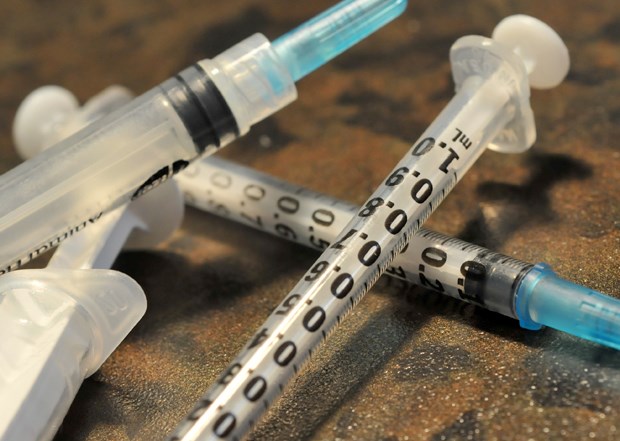The rate of fatal drug overdoses is climbing to nearly unprecedented levels in B.C.
The province recorded 256 deaths – including two in North Vancouver – in the first four months of the year, an increase of almost 90 per cent over the same period last year, according to a release from the B.C. Coroners Service.
“We suspect a lot of (the overdose deaths) have to do with … illicit fentanyl that’s contaminating the drug supply,” said North Shore public health officer Dr. Mark Lysyshyn.
While difficult to distinguish from heroin, fentanyl can be 50 times as toxic and is frequently sold as a substitute for more expensive drugs to unwitting buyers.
The provincial health officer declared an emergency in April after reports revealed fentanyl was likely a factor in nearly half of fatal overdoses this year.
The clandestinely synthesized drug was detected in five per cent of fatal overdoses in 2012. By 2015, fentanyl was listed as a factor in 32 per cent of overdose deaths.
While making substantial changes will be a slow process, Lysyshyn said more information is being shared between coroners and health officers about where overdoses are most frequent.
Knowing where overdoses happen can help health officials pinpoint programs such as supervised injection services and take-home naloxone programs, according to Lysyshyn.
While the majority of overdoses take place in Vancouver and Surrey, North Vancouver hasn’t been exempt from the rising overdose rates.
There have been 18 overdose deaths in North Vancouver in the past 28 months. There were 17 overdose deaths over the previous seven years, according to the Coroners Service.
Exacerbating the problem is a host of compounds – some even more powerful than fentanyl – that show up on the street only to vanish, according to Lysyshyn. It’s a predicament that often leaves health officials playing catch-up.
“When we do tests on people who have had overdoses we’re not always able even to detect these chemicals because we don’t necessarily know about them,” Lysyshyn said.
Opioid overdoses – including fentanyl – can be treated with an injection of naloxone, a medicine that can prevent brain damage if administered in time.
Naloxone does not work for overdoses of cocaine or alcohol. Naloxone is available at the Health Connection Clinic, on East 15th Street in North Vancouver.
While street drugs remain a danger, West Vancouver police are reminding residents of the risks that could be lurking in their medicine cabinet.
Police are asking residents to take expired or otherwise unneeded prescription drugs to pharmacies where they can be safely disposed of.
Approximately eight per cent of Canadian youth between Grade 6 and 12 reported using prescription and over-the-counter drugs to get high, according to a 2011 survey funded by Health Canada.



